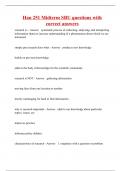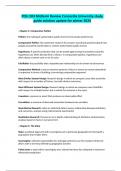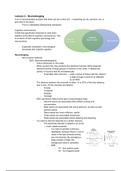correct answers
research is: - Answer systematic process of collecting, analyzing, and interpreting
information (data) to increase understanding of a phenomenon about which we are
interested
simply put research does what - Answer produces new knowledge
builds on previous knowledge
adds to the body of knowledge for the scientific community
research is NOT - Answer gathering information
moving facts from one location to another
merely rummaging for hard to find information
why is research important - Answer adds to our knowledge about particular
topics, issues, ect
improves practice
informes policy debates
characteristics of research - Answer 1. originates with a question or problem
,2. requires clear goal
3. divides main problem into subproblems
4. is guided by the specific research problem, question or hypothesis
5. requires a specific plan for proceeding
6. accepts certain critical assumptions
7. requires the collection and interpretation of data in an attempt to resolve the
problem that initiated the research
What is a hypothesis? - Answer A logical supposition, a reasonable guess, an
educated conjecture
Provides a tentative explanation for a phenomenon under investigation
May direct thinking to possible sources of information necessary to resolve the
research problem and its subproblems.
research methodology - Answer way to systematically solve the research problem
research design - Answer refers to the structure of an inquiry
selected design best suited to answer the research question
research methods - Answer methods of sampling, data collection and data
analysis
methods/tools can align with one or more designs
criteria for judging QUANTITATIVE research - Answer internal validity
, external validity
reliability
objectivity
criteria for judging QUALITATIVE research - Answer credibility
transferability
dependability
confirmability
the research cycle - Answer 1. Begins with a problem.
2. Defines the goals with a clear statement of the problem.
3. Subdivides the problem into subproblems.
4. posits tentative solutions to the problem(s) though hypothesis.
5. Looks for data directed ny the hypotheses and guided by the problem. Data are
collected and organized.
6. Interprets the meaning of the data, which leads to a resolution of the problem
thus supporting or not supporting the hypothesis
Theory - Answer An organized body of concepts and principles intended to
explain a particular phenomenon.
Tentative explanations that new data either support or do not support
Apt to drive further research






